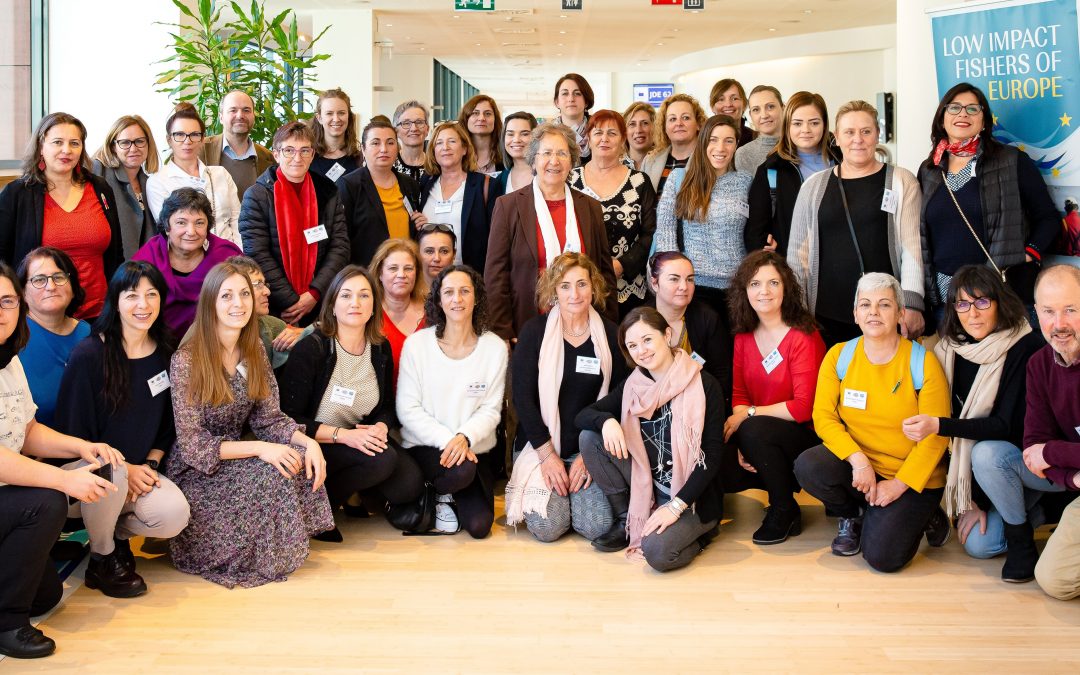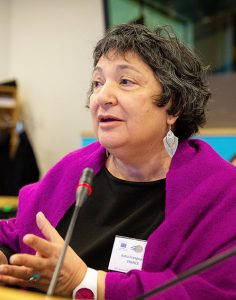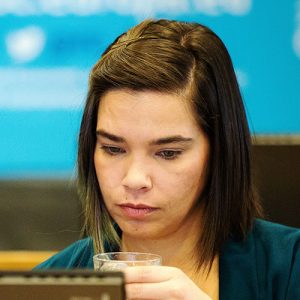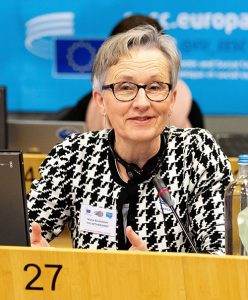“The studies must be flawed”, they said. “Why are they not seeing all the women in fisheries?”
By Dr Ruth Brennan, TCD
The end of February saw the relaunch of the AKTEA European Network of Women in Fisheries during a three day event in Brussels, co-organised by AKTEA and LIFE—Low Impact Fishers of Europe—in partnership with the European Economic and Social Committee.
More than forty women in fisheries from Ireland, Italy, Croatia, Malta, Cyprus, Spain, the Azores, France and the Netherlands gathered to share their stories and build new networks.
The aim of the event was to breathe new life into AKTEA, a women in fisheries network that was established in 2006, following a three year exchange programme between European women in fisheries and aquaculture. The name AKTEA derives from Greek mythology – Aktea was the goddess of the shore.
The members of the AKTEA network include independent national and regional level organisations that represent independent fisherwomen, and wives and partners of fishermen, involved in fish processing, sales and administration, fisherwomen (in boats and onshore), shellfish gatherers and net menders.
I was invited by Brian O’Riordan (Executive Secretary of LIFE) and Dr Katia Frangoudes (a founding member of AKTEA) to attend the workshop with a representative of Irish women in fisheries. As my current research project, CO-SUSTAIN (belongingtothesea.com), focuses on small-scale fisheries in the Irish islands, I was keen to find a woman in fisheries from the islands.
I was delighted when Keara Osborne of Iasc Inis Oírr (@iascinisoirr) agreed to join me, and hugely grateful when MEP Luke ‘Ming’ Flanagan and MEP Grace O’Sullivan kindly agreed to sponsor Keara’s participation in the event. Set up in May 2018, Iasc Inis Oírr is a small family business, selling and processing fresh local crab, pollock, mackerel and lobsters from the Galway island of Inis Oírr, caught in the family’s two small boats.
The first day was very informal and relaxed as we gathered in a circle in the Institute for Cultural Affairs in Brussels for initial introductions. I quickly became aware that we had no official interpreters in the room. As each woman introduced herself in her language of choice, her words were followed by a soft hum of conversation throughout the room as the unofficial interpreters translated her words to their neighbours. These continuous translation intermissions slowed the rhythm right down, and really allowed a sense of connection and solidarity to build between us, as we listened to stories in unfamiliar languages, repeated in languages we could understand.
The introductions were started by Maria Bekendam, a fisherwoman from the Netherlands, who has been the Chairperson of AKTEA since 2006. “Together with my partner, I run a fishing enterprise. I don’t say ‘I am married to a fisherman’. It’s an important distinction”.
We heard from Emanuela in Istria, Croatia who, together with her sons, daughters and brother, has been running the family business with four fishing boats since her husband passed away in 2009. She was very clear that she identifies as a fisherwoman rather than as a businesswoman.
Also from Istria, Branka explained how she shares the job equally with her husband and spends most of her day at sea – one skippers the boat while the other sets and hauls the nets. They have worked together on their three fishing boats for 20 years.
Elena and Stella were both from Cyprus. Elena runs a fishmongers, taking in catch from 20 boats, including her father’s four small boats. Stella has been fishing with her father from a young age – gender was irrelevant to him, she told us. She also prepares the fish boxes and deals with the company administration.
From Malta, we heard from Martes and Lily. Martes works with her husband on his small boat and is also diversifying the business into tourism, to make ends meet. Lily’s main income is from trading as a fishmonger. Her day starts at 2.30 a.m. when she goes to buy the fish. She sells it in the market until 11 a.m., returns home to quickly cook some food, then goes to help her husband prepare the nets for fishing. Somehow, Lily also manages to find time to take care of all the paperwork and go to the pontoon to sell boat trips to tourists.
Keara from Iasc Inis Oírr explained how she cooks, cleans, processes and packages the catch caught by her partner and his father. She is responsible for all of the business paperwork and works with local banks when finance is needed. Keara pointed out that much of the legislation she deals with is written for large fishing companies rather than for the small-scale sector, and that part of her job involves translating that down to what works for them.
Ilidia from the Azores in Portugal elicited a spontaneous round of applause when she told us that she is divorced from her husband and now fishes from her own 7m boat with her daughter.
Raquela from Valencia, Spain comes from a 3rd generation fishing family and does everything from preparing nets and skippering her two boats with another fisherwoman, to selling the fish. They are the only women in Valencia who are qualified skippers and who skipper their own fishing boats.
Anne-Marie from the Basque country in France fished with longlines for 30 years and recently sold her 10m fishing boat so that she could retire. Catherine from Brittany, France works with her husband and two full time employees year-round to harvest seaweed from the shore by hand, using a sickle. They process the seaweed for industrial use and also harvest edible seaweeds to make seaweed tartare. She observed that they are among the last people doing this traditional activity which dates back centuries.
As the introductions drew to a close, the conversations continued to flow as women pulled their chairs into smaller groups that formed organically around their shared experiences and challenges. The fisherwomen from Ireland, Malta and Cyprus talked together about their small businesses that have integrated catching, processing and selling their fish.
I am convinced that the relaxed rhythm and informal flavour of the first day gave many of the women the confidence to speak in the far more formal surrounds of the European Economic and Social Committee, with microphones, headphones, interpreters in booths and various European officials in attendance.
The following day, I witnessed these women give articulate accounts of the multiple ways that women are involved in fisheries, from harvesting fish and shellfish, to seaweed gathering, tourism, and management and administration of the business, including Keara Osborne who explained the vertical integration and diversification of Iasc Inis Oírr.
This was preceded by informative briefings about EU fisheries and social policy, gender issues and the rights of women professionals in the sector. We heard from Gabriel Sarró Iparraguirre, EESC Rapporteur, on the importance of the social dimension of fisheries.
Brian O’Riordan (LIFE) gave us a history of the EU and its fisheries policies, that really brought down to earth how such policies affect the lives of small scale fishers and fishing communities.
Dr Katia Frangoudes (AKTEA spokesperson) spoke about women’s rights and participation in decision-making. She highlighted European studies that have reported a very low involvement of women in fisheries. This prompted outbursts of disbelief from the women listening.
“The studies must be flawed”, they said. “Why are they not seeing all of the women in fisheries?”
Dr Katia Frangoudes explained that it’s because these studies are only counting women in boats. The conversations the previous day provided ample evidence that women’s work in fisheries extends far beyond women in boats.
A telling visual was offered by Marja Bekendam, Chair of AKTEA, when she remarked that the changing colour of her hair was an indicator of how long she has been telling this story of lack of recognition for women in fisheries. “But we are moving from invisibility to visibility”, she concluded.
MEP Ana Miranda Paz led a roundtable where we heard about opportunities and constraints experienced by Spanish fisherwomen, harvesters, net makers, processors, entrepreneurs, business managers and homemakers. Perhaps the strongest statement of the day came from Sandra Amézaga, who leads Mulleres Mar Arousa, a Galician association supporting women in fisheries:
“We are experts in many fields but if we’re not in decision-making roles it’s as if we’re not there. We shouldn’t be afraid of feminism. A feminist is a women asking for equality, nothing more! We don’t want to be seen as victims. No! We are action makers!”
FARNET team leader, Gilles Van de Walle, illustrated just how important it is for women to be at the decision-making table and not just in management roles when it comes to Fisheries Local Action Groups. He reported on the first coherent study accounting for women in fisheries at all levels of the workforce, including unpaid work. The female workforce accounts for 27% of the seafood sector employment, broken down into 57% of processing jobs, 36% ancillary jobs (such as sales, administration, netmaking), 26% in aquaculture and 13% in fisheries.
In a stark slide, he reported a significant gender imbalance at the FLAG decision-making table (three times more men than women), where the FLAG board takes decisions on which projects to support. He noted that there is a direct correlation between this imbalance and the percentage of projects directly supporting women in fisheries.
In other words, increasing the percentage of women on FLAG decision making boards would result in more projects being funded that directly support women in fisheries. He acknowledged that the FLAGs have work to do in this regard.
In a video address to the meeting, European Commissioner for the Environment, Oceans and Fisheries, Virginius Sinkenvičius, echoed this recognition of the lack of representation of women in the formal governance structures of the fishing industry.
He reiterated his commitment to supporting the social dimension in fisheries, including gender equality, both through the European Maritime and Fisheries Fund, and in the implementation of the Common Fisheries Policy, which is due to be reviewed by December 2022.
AKTEA and LIFE have since submitted a request for a formal meeting with the Commissioner to discuss concrete ways to bring about more inclusive and equitable implementation of the Common Fisheries Policy.
It was an eye-opening experience to spend two days listening to so many strong and articulate women, and learning about the myriad ways in which they are an integral part of the fishing industry. Without them, the fishing industry simply wouldn’t be. Maybe it’s time we valued them more.
Access to official photos of the event and speakers’ presentations can be found here
The referenced study on FLAG support to women in fisheries and aquaculture is available here
Keara’s speech from the event can be found here: here
Dr Ruth Brennan is a Marie Skłodowska-Curie Individual Fellow (2018-2020) at Trinity College Dublin’s Centre for Environmental Humanities. She is also Sea Fisheries Advisor to Luke ‘Ming’ Flanagan MEP.
The CO-SUSTAIN project (www.belongingtothesea.com) has received funding from the European Union’s Horizon 2020 research and innovation programme under the Marie Skłodowska-Curie grant agreement No 789524
All images courtesy of Low Impact Fishers of Europe (LIFE)



